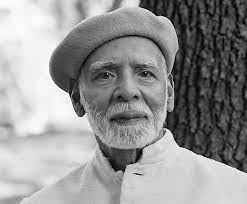In today’s world, success is often equated with wealth, power, and influence, and business schools have become synonymous with cultivating the next generation of high-flying entrepreneurs and corporate leaders. Yet, a deeper reflection reveals a profound truth that is often overlooked in the corridors of the world’s top business schools. Amid the buzzwords of “leadership,” “innovation,” and “strategy,” there is a glaring gap—a silence about the importance of inner tranquility, wisdom, and the ability to maintain equanimity in the face of life’s turbulence.
This gap is not something new. Thousands of years ago, spiritual teachings, such as the Bhagavad Gita, were already addressing this very imbalance. While the world has modernized, the fundamental principles that govern human well-being and success have remained timeless. This brings us to the heart of the matter: Why did Steve Jobs recommend an ashram to Mark Zuckerberg as a key to success? And why is it that the serene simplicity of ashram culture often proves to be more effective than even the best business schools in nurturing not only success but also a peaceful, fulfilling life?
The Pressure Cooker of Modern Business Schools
When we think of a business school today, images of competitive environments, rigorous curriculums, and an intense focus on financial success spring to mind. These institutions pride themselves on creating leaders who can navigate the complexities of global markets, innovate in times of uncertainty, and stay ahead in an ever-changing economic landscape. And they do deliver. Business schools produce some of the brightest minds in the world, equipped with technical skills, management principles, and an understanding of the intricacies of the business world.
Yet, what is often left unaddressed is the state of the mind that drives all these actions. A high IQ and a prestigious degree may open doors, but what about the mental resilience needed to handle the inevitable stresses that come with it? The relentless pressure to outperform, to be the best, to meet and exceed expectations can lead to burnout, anxiety, and an unfulfilled sense of success. This is where ashram culture diverges sharply and profoundly.
The Ancient Wisdom of the Ashram: Serenity as Success
An ashram, by contrast, offers an entirely different perspective on what it means to be successful. Rooted in ancient Indian philosophy, an ashram is not just a retreat or a place of spiritual learning; it is a way of life that emphasizes inner growth, mental clarity, and the cultivation of wisdom. These are the same qualities the Bhagavad Gita highlights as essential for living a successful and meaningful life. The serenity of the mind, or shanti, is regarded as the foundation for clear thinking, effective action, and, ultimately, true success.
Steve Jobs’ suggestion for Zuckerberg to visit an ashram wasn’t just a quirky piece of advice. It was a recognition of the importance of grounding one’s ambitions in a calm, focused state of mind. Jobs himself had been deeply influenced by his time spent in India, and his personal experiences with Zen Buddhism shaped the way he approached life and business. The ashram teaches that when the mind is in turmoil, no matter how intelligent or capable you are, your actions will be compromised. This is something that business schools, with their focus on external achievements, often fail to teach.

The Peaceful Warrior: Arjun’s Dilemma and the Modern Professional
The Bhagavad Gita’s teachings are not confined to monks or saints; they are for people engaged in the world, much like the dynamic, ambitious young professionals of today. The character of Arjun in the Gita represents the modern-day entrepreneur or leader—highly capable, and full of potential, but mentally torn and emotionally conflicted. Arjun stands on the battlefield, a metaphor for life’s many challenges, paralyzed by doubt and anxiety despite being one of the greatest warriors.
This inner battle is familiar to many who walk the high-stakes path of modern business. Even with all the necessary tools for success, the pressure of constant decision-making, the responsibility of leading teams, and the never-ending quest for growth can leave one feeling overwhelmed. The Gita’s prescription for Arjun is not more strategy or skill training; it is a call to cultivate mental serenity, act with detachment from the outcome, and stay rooted in one’s higher purpose. This is the essence of karma yoga, the yoga of action—acting without attachment to the fruits of the action, which ultimately leads to both success and peace of mind.
Why Ashrams Excel Where Business Schools Fall Short
- Cultivating Inner Peace and Resilience: Business schools train individuals to deal with external challenges, but ashrams teach the mastery of the inner self. In an ashram, meditation, mindfulness, and practices like yoga are not just stress-relief techniques; they are fundamental tools for sharpening the mind, enhancing emotional intelligence, and fostering resilience. In the high-pressure world of business, it is not enough to know how to manage a crisis; one must know how to remain calm and composed in the midst of chaos. This calmness is what allows for sharp decision-making and innovative problem-solving.
- The Power of Detachment: One of the key teachings in the Bhagavad Gita, as well as in many ashram philosophies, is the concept of detachment from the results of one’s actions. This does not mean apathy or a lack of ambition; rather, it is about focusing fully on the process, doing one’s best, and leaving the results to unfold naturally. In business, this translates to not being overly fixated on immediate outcomes—whether it’s quarterly profits, stock prices, or market share—while maintaining a long-term vision. By detaching from the outcome, individuals free themselves from the paralyzing fear of failure, allowing creativity and innovation to flourish.
- Holistic Success: Beyond Wealth and Power: Success in an ashram is not measured by material wealth or social status. It is measured by inner growth, self-awareness, and the ability to live in harmony with oneself and the world. While business schools produce individuals who are successful in the conventional sense, many of these graduates find themselves lacking fulfillment despite their achievements. Ashram culture teaches that true success is holistic—it encompasses not only career success but also personal well-being, mental peace, and a sense of purpose. In the long run, this leads to a richer, more satisfying life.
- Service and Compassion as Cornerstones: Unlike the often competitive and individualistic environment of business schools, ashram life emphasizes service, compassion, and selflessness. This doesn’t mean that ambition is discouraged; rather, it is aligned with the greater good. In an ashram, success is not about stepping on others to get ahead but about lifting others up along the way. This principle of seva (selfless service) can be transformative in the corporate world, fostering leaders who inspire through empathy, collaboration, and a genuine concern for the well-being of their teams and communities.
- Long-Term Thinking and Patience: In business, there is often a focus on short-term results, driven by the pressure of quarterly earnings reports and the desire for immediate gratification. Ashrams, on the other hand, instill a sense of patience and long-term thinking. The cultivation of wisdom, mental clarity, and spiritual growth is not something that happens overnight; it requires time, dedication, and perseverance. This mindset, when applied to business, helps leaders build companies that are not only profitable but also sustainable in the long run.
The Modern Ashram: Integrating Ancient Wisdom with Today’s World
It’s important to note that embracing the principles of ashram life does not mean renouncing the world or abandoning one’s career ambitions. In fact, some of the most successful and innovative leaders today, from Silicon Valley to Wall Street, have found ways to integrate mindfulness, meditation, and the principles of inner peace into their professional lives. They recognize that while business schools can provide the technical skills needed to succeed, the real edge comes from mastering the inner game.
Consider Ray Dalio, the founder of Bridgewater Associates, who credits much of his success to his daily practice of transcendental meditation. Or Bill George, former CEO of Medtronic and now a Harvard Business School professor, who speaks openly about the importance of finding one’s “True North” through mindfulness and self-awareness. These leaders have recognized that the real key to sustained success lies not in external achievements but in cultivating a calm, centered mind.
The Power of Calmness in Achieving Success
While we have touched on the essential differences between ashram culture and business schools, it’s vital to explore real-world examples that show how remaining calm in challenging situations leads to lasting success. The following case studies illustrate how the practices learned in ashram settings, focusing on inner peace, mindfulness, and detachment, have resulted in remarkable personal and professional triumphs. These examples contrast starkly with the high-stress, competitive environment of top business schools, emphasizing that success and peace of mind go hand in hand.
Case Study 1: The Steve Jobs Journey—A Tech Visionary Finds His Center
Steve Jobs’ story is often recounted in the context of technological innovation, but less frequently discussed is the impact of his time in India on his personal and professional life. In 1974, Jobs embarked on a journey to India, inspired by his interest in Eastern philosophy and spirituality. He spent months traveling across the country, eventually visiting the Neem Karoli Baba Ashram. Though he did not meet the revered saint, the spiritual experiences and the ashram culture left a deep imprint on him.
What Jobs learned in India was the power of stillness and simplicity. This influenced his entire philosophy, from the design of Apple products to his leadership style. His famous focus on simplicity—both in product design and in life—was rooted in the calmness and clarity of mind he cultivated through his spiritual journey.
In later years, as Apple faced numerous crises—ranging from competition to his own ouster and eventual return to the company—Jobs maintained a Zen-like calm. Even during the toughest moments, his ability to step back and see the bigger picture allowed him to make calculated, visionary decisions, which ultimately led to Apple’s resurgence. His time in the ashram, learning to remain detached from ego and external pressures, was key to his long-term success.
Case Study 2: The Wisdom of Eknath Easwaran—Balancing Academics and Spiritual Practice
Eknath Easwaran was a distinguished professor, author, and spiritual teacher who moved from India to the United States in the 1950s. Before founding the Blue Mountain Center of Meditation in California, Easwaran served as a professor of English literature at a leading Indian university. His work seamlessly blended the intellectual rigor of academia with the spiritual wisdom of ancient Indian teachings, particularly those of the Bhagavad Gita.

Easwaran’s philosophy of “passage meditation” emphasized staying calm and focused in the most stressful situations. This technique involved choosing a passage from a spiritual text, repeating it silently, and focusing the mind on the deeper meaning of the words. Over time, this practice calms the mind and cultivates resilience, enabling individuals to remain composed in challenging situations.
This calm and mindful approach allowed Easwaran to balance his academic responsibilities with his spiritual pursuits. His students reported that Easwaran’s unique ability to remain centered and calm, even in the midst of intense academic debates and deadlines, made him a powerful role model. Many of his students went on to excel in their academic and professional lives by adopting his practices, which helped them handle pressure with grace.
Unlike business schools that focus on competition and results, Easwaran’s teaching highlighted how personal calmness and detachment from immediate outcomes create long-term success. His case serves as a powerful example of how ashram-based learning leads to both academic excellence and career fulfillment without the burnout typically associated with high-pressure environments.
Case Study 3: Vivek Bhat: The Corporate Leader Who Chose Calm Over Chaos
Vivek Bhat, a high-ranking executive at a global financial services firm, attributes much of his career success to the principles of inner calm and mindfulness he learned during a sabbatical in an Indian ashram. Bhat, a graduate of one of the world’s top business schools, found that despite his professional achievements, he was struggling with burnout and anxiety. Long hours, pressure to perform, and constant stress had taken a toll on both his health and well-being.
In 2016, Bhat took a three-month break from his career and traveled to an ashram in Rishikesh, India, where he immersed himself in meditation, yoga, and the study of ancient spiritual texts, including the Bhagavad Gita. What he learned was not just how to relax, but how to cultivate a calm mind amidst chaos. He realized that staying calm in difficult situations was not a sign of weakness but of strength. This shift in mindset allowed him to approach challenges with greater clarity and confidence.
Upon returning to his corporate role, Bhat found that he was able to make better decisions and lead more effectively. He applied the principle of detachment from the results, focusing instead on doing his best in the moment. Over time, his newfound composure led to a dramatic improvement in both his work performance and his personal life. His team noticed that his calm, unflappable demeanor during stressful situations made him a more effective leader, resulting in better project outcomes and a more positive work environment.
Bhat’s experience demonstrates that the skills learned in an ashram—calmness, detachment, and mindfulness—are far more sustainable in the long run than the high-pressure strategies often taught in business schools. His career continued to soar, but this time with a foundation of inner peace that kept him balanced.
Case Study 4: Geeta Menon: The Social Entrepreneur Who Chose Compassion Over Competition
Geeta Menon, a social entrepreneur from India, built a successful career by applying the principles she learned from the ashram way of life. After completing her MBA from a top-tier business school, Menon worked in the corporate world for several years. However, she found that the competitive, cutthroat environment left her feeling empty and disconnected from her true purpose. This dissonance led her to explore spiritual teachings, and she eventually spent time in a rural Indian ashram, where she embraced the principles of service (seva), mindfulness, and compassion.
Menon’s time in the ashram transformed her perspective on success. Instead of measuring success by wealth or accolades, she began to see it as a function of service to others. When she returned to the corporate world, she used her business skills to start a social enterprise focused on empowering women in rural India through sustainable livelihoods. The lessons she learned in the ashram—staying calm, focusing on the well-being of others, and not being attached to short-term gains—became the foundation of her approach.
In contrast to her business school training, where competition was fierce and the emphasis was on individual achievement, the ashram taught Menon the value of collaboration and service. Her ability to remain calm in the face of business challenges, coupled with her compassionate leadership, has resulted in her social enterprise becoming one of the most successful in its field, with a lasting impact on the lives of thousands of women.
Menon’s case highlights how the ashram’s focus on peace of mind, service, and long-term thinking leads to more sustainable, impactful career success than the competitive, profit-driven model taught in many business schools.
Case Study 5: Rajesh Vyas: The Academic Achiever Who Embraced Detachment
Rajesh Vyas, an Indian scholar and academician, had always been a high achiever. As a professor at a renowned university, Vyas excelled in his field, producing groundbreaking research. However, the pressure to publish, meet grant deadlines, and maintain his reputation in a competitive academic world was overwhelming. The constant stress led to mental exhaustion, which began to affect both his work and personal life.
In search of relief, Vyas took a sabbatical to study at a traditional Indian ashram. During his time there, he practiced meditation, and pranayama (breathing exercises), and engaged in the study of the Vedantic texts. The ashram environment emphasized detachment—not just from material success, but from the need for external validation. Vyas realized that much of his anxiety stemmed from his attachment to outcomes, particularly the pressure to be recognized and praised for his work.
When Vyas returned to his academic role, he applied the principles of detachment he had learned in the ashram. Rather than worrying about how his research would be received or whether he would be awarded grants, he focused on the joy of inquiry and the process of discovery. To his surprise, this shift in mindset not only reduced his stress but also improved the quality of his work. His colleagues noticed that his ideas had become more innovative and his work more impactful, all while he maintained a sense of calm and balance.
This case underscores how the ashram way of learning—through detachment, mindfulness, and inner peace—can lead to excellence in academia. Vyas’ success wasn’t the result of external pressure or competition, but of a calm, focused mind that allowed him to produce brilliant work without being weighed down by the need for recognition.
Conclusion: The Future Belongs to Those Who Master Both Worlds
In a world that often equates success with busyness and achievement with stress, the wisdom of the ashram offers a refreshing and necessary alternative. While business schools focus on external accomplishments, ashrams provide the tools for mastering the inner self. And in the end, it is this mastery that leads to true, lasting success—success that is not only defined by wealth and power but also by peace of mind, purpose, and the ability to lead a rich, fulfilling life.

In the words of the XIV Dalai Lama, “Having a calm or peaceful state of mind doesn’t mean being spaced out or completely empty. Peace of mind or a calm state of mind is rooted in affection and compassion and is sensitive and responsive to others.” This, ultimately, is what ashrams provide that business schools do not—a holistic approach to success that integrates both the mind and the heart. As more and more leaders begin to recognize this, the future of success will not be found in boardrooms alone but in the stillness of the mind and the serenity of the soul.
The case studies offer a clear illustration of how the principles of calmness, detachment, mindfulness, and service learned in an ashram can lead to sustained success, not only in terms of career achievements but also in personal fulfillment and peace of mind. While business schools focus on short-term gains, competition, and immediate results, the ashram way teaches a deeper, more sustainable path to success—one that prioritizes mental clarity, emotional resilience, and a long-term vision.
The lessons from these stories show that success doesn’t have to come at the cost of one’s well-being. Instead, when approached with the calmness and wisdom cultivated in an ashram, success becomes a natural byproduct of living a balanced, thoughtful, and peaceful life.
Disclaimer:
The author’s views are his or her own. The facts and opinions in the article have been taken from various articles and commentaries available in the online media. Eastside Writers nor the writer takes any responsibility or obligation for them.
Note: Contact our Writers at www.eastsidewriters.com for writing Blogs/Articles on any niche. We have experts in various domains from Technology to Finance and from Spirituality to Lifestyle and Entertainment.







Pingback: The True Wealth: Why Peace of Mind Outweighs Money as the Ultimate Motivator - Eastside Writers